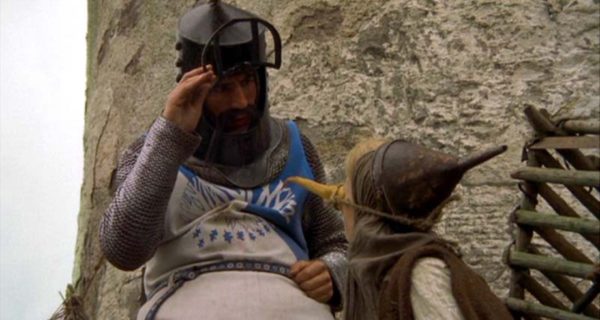If I want to laugh, there’s a good chance I’ll listen to the soundtrack of Monty Python and the Holy Grail. One of my favorite tracks/skits is “A Witch”. I suggest you listen to it or watch it, but here’s a summary.
Villagers drag a woman before Sir Bedevere, claiming she is a witch and ought to be burned. Their evidence? One of the villagers claims she turned him into a newt. Sir Bedevere explains that there are ways of telling whether someone is a witch, then leads them through this exercise of logic:
BEDEVERE: Tell me, what do you do with witches?
CROWD: Burn them up!
BEDEVERE: And what do you burn apart from witches?
VILLAGER #1: More witches!
VILLAGER #2: … Wood!
BEDEVERE: So, why do witches burn?
[pause]
VILLAGER #3: B –… ’cause they’re made of wood?
BEDEVERE: Good! So, how do we tell whether she is made of wood?
VILLAGER #1: Build a bridge out of her.
BEDEVERE: Aah, but can you not also make bridges out of stone?
VILLAGER #2: Oh, yeah.
BEDEVERE: Does wood sink in water?
VILLAGER #1: No, no.
VILLAGER #2: It floats! It floats!
VILLAGER #1: Throw her into the pond!
BEDEVERE: What also floats in water?
CROWD: Bread! Apples! Very small rocks! Cider! Uhhh, gravy! Cherries! Mud! Churches – churches! Lead – lead!
ARTHUR: A duck.
CROWD: Oooh.
BEDEVERE: Exactly! So, logically…
VILLAGER #1: If… she… weighs the same as a duck… she’s made of wood.
BEDEVERE: And therefore?
VILLAGER #1: A witch!
My brothers and I have referenced this scene often enough that my mom occasionally will mention part of it, though she has never seen or heard the scene (by her choice).
I was thinking about Monty Python and the Holy Grail in all its ridiculous glory when I realized that similar skewed logic is used all the time in the real world, as if it were true logic. The conclusion seems sure before the argument, and as often as not, it is to the detriment of others. The most common skewed argument I have heard is that one person’s life is worth more than another’s. Granted, the arguments are not worded in that way, and the arguer may not even realize the argument is based on this idea. But delve deep enough and it is the kernel of the argument.
To the villagers in Monty Python and the Holy Grail, the woman accused of being a Witch had less value than the rest of the villagers. To the French soldiers seen in other sections of the story, the “stuffy English kinigets” were certainly seen as inferior. In modern times, women are seen by some to have more worth than unborn children. People who have traditional smarts may be valued more than those who don’t fit in that category. Younger, healthier people are seen by some to have more worth than older, sick, or infirm people. One group’s members are seen by some to have more value than the members of a different group. Some people see themselves as having more worth than anyone else, while others see everyone else as having more worth than them.
How do we rectify this, to stop the prejudice? We need to stop this lie that some lives are more valuable than others, as God values us equally, young and old, born and unborn, innocent and guilty. We can help stop the lie by doing our best to treat everyone with the same respect, even when it is hard. And we need to try to help the people around us do the same. Is it difficult? Of course. Is it possible? With God’s grace, yes.

